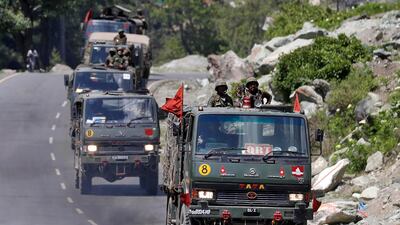China on Friday denied detaining Indian soldiers after a deadly border clash on Monday, contradicting reports in Indian media that 10 had been released late on Thursday.
India's government made no immediate comment but the army released a statement to say there were no remaining soldiers "missing in action" after the fighting in the Galwan Valley area of Ladakh.
Chinese Foreign Ministry spokesperson Zhao Lijian insisted that “China hasn’t seized any Indian personnel” when asked about the media reports.
Mr Zhao reiterated China's position that India was to blame for the fighting along the disputed border in the Ladakh region that left 20 Indian soldiers dead. "The right and wrong is very clear and the responsibility lies entirely with the Indian side," he said at a daily news briefing.
The Indian military said 18 troops were being treated for serious injuries after the battle.
China has admitted that its forces suffered casualties but has not given figures.
Mr Zhao said the two countries are in communication through diplomatic and military channels.
“We hope India can work with China to maintain the long-term development of bilateral relations,” he said.
The confrontation in the Galwan Valley, part of the disputed Ladakh region along the Himalayan frontier, was the deadliest conflict between the sides in 45 years.
Prime Minister Narendra Modi, who is facing public calls for sanctions against Beijing and a boycott of Chinese goods, called a videoconference with opposition parties on Friday to discuss the border crisis.
Thousands of people turned out for the funerals on Thursday of the soldiers killed in the clash, and Chinese flags and posters of China's President Xi Jinping have been burned in several Indiancities.
The two sides have held a series of political and military talks in a bid to bring tensions down but warned each other against further violence in public statements.
"India wants peace," Mr Modi said this week, "but if provoked, India is capable of giving a befitting reply."
Beijing said in turn that India should "not underestimate China's firm will to safeguard its territorial sovereignty," after talks between its foreign minister Wang Yi and his Indian counterpart Subrahmanyam Jaishankar.
Mr Modi's government also faces a longstanding border battle with arch-rival Pakistan over Kashmir and a frontier dispute with neighbouring Nepal.
On Friday, Nepal's president approved a new national emblem with a map that includes territories claimed by India, further straining ties between the two nations.
India's foreign ministry said Nepal's claims to territory along the Kali River and in neighbouring Kalipani region were "not based on historical fact or evidence".

